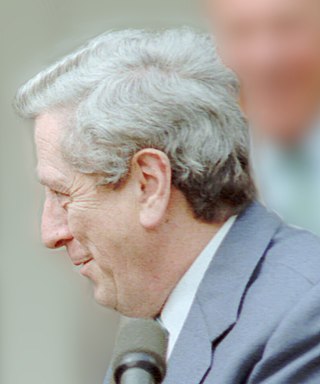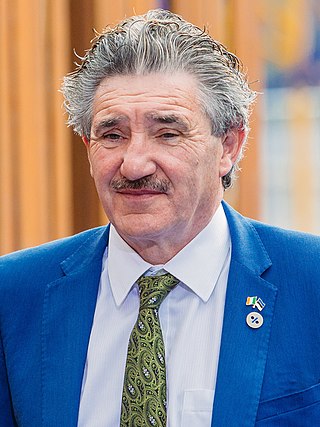Related Research Articles
The 26th government of Ireland was the government of Ireland formed after the 2002 general election to the 29th Dáil which had been held on 17 May 2002. It was led by Fianna Fáil leader Bertie Ahern as Taoiseach, with Progressive Democrats leader Mary Harney as Tánaiste. It was the first, and to date only, coalition government to be returned to government after an election; both parties increased their number of seats, and together secured a Dáil majority, where in the previous government they had governed together as a minority government dependent on the support of Independent TDs. It lasted for 1,835 days.
The 25th government of Ireland was the government of Ireland formed after the 1997 general election to the 28th Dáil held on 6 June 1997. It was a minority coalition government of Fianna Fáil and the Progressive Democrats, led by Fianna Fáil leader Bertie Ahern as Taoiseach. It lasted 1,807 days.
The 20th government of Ireland was the government of Ireland formed after the 1987 general election to the 25th Dáil on 17 February 1987. It was a minority Fianna Fáil government which had the qualified support of Fine Gael, the main opposition party, an arrangement known as the Tallaght Strategy after a speech by its leader Alan Dukes. The national debt had doubled under the previous government. The government introduced budget cuts in all departments. The taxation system was also reformed. One of the major schemes put forward was the establishment of the International Financial Services Centre (IFSC) in Dublin. During this period the Government organised the 1,000-year anniversary of the founding of Dublin.
There were two governments of the 26th Dáil elected at the 1989 general election on 15 June 1989, both being coalition governments of Fianna Fáil and the Progressive Democrats. The 21st government of Ireland was led by Charles Haughey as Taoiseach and lasted 945 days. The 22nd government of Ireland was led by Albert Reynolds as Taoiseach and lasted 308 days from its appointment until resignation, and continued to carry out its duties for a further 29 days until the appointment of its successor, giving a total of 337 days.

The 19th government of Ireland was the government of Ireland formed after the November 1982 general election to the 24th Dáil. It was a coalition government of Fine Gael and the Labour Party led by Garret FitzGerald as Taoiseach and lasted for 1,548 days.
There were two governments of the 21st Dáil, which was elected at the 1977 general election on 16 June 1977. Both were single-party majority Fianna Fáil governments. The 15th government of Ireland was led by Jack Lynch as Taoiseach and lasted for 890 days. The 16th government of Ireland was led by Charles Haughey and lasted for 568 days.
The 14th government of Ireland was the government of Ireland formed after the 1973 general election to the 20th Dáil held on 28 February 1973. It was a coalition government of Fine Gael and the Labour Party, known as the National Coalition, led by Liam Cosgrave as Taoiseach with Brendan Corish as Tánaiste. It was the first time either of the parties had been in government since the second inter-party government (1954–57), when they were in coalition with Clann na Talmhan. It lasted for 1,575 days. The government was widely referred to as the "cabinet of all the talents".
The 13th government of Ireland was the government of Ireland formed after the 1969 general election to the 19th Dáil held on 18 June 1969. It was formed by Fianna Fáil, which had been in office since the 1957 general election. This was the first election it won with Jack Lynch as its leader. It lasted for 1,352 days.
There were two governments in the 18th Dáil, which was elected at the 1965 general election held on 7 April 1965. Both were single-party Fianna Fáil governments, which had been in government since the 1957 election. The 11th government of Ireland was led by Seán Lemass as Taoiseach and lasted for 569 days. The 12th government of Ireland was led by Jack Lynch as Taoiseach and lasted for 966 days.
The 10th government of Ireland was the government of Ireland formed after the 1961 general election to the 17th Dáil held on 4 October 1961. It was a minority government formed by Fianna Fáil, which had been in office since the 1957 election. It was the first election it had won since Seán Lemass had succeeded Éamon de Valera as leader. It lasted for 1,289 days.
The 6th government of Ireland was the government of Ireland formed after the 1951 general election held on 30 May to the 14th Dáil. It was a single-party Fianna Fáil government led by Éamon de Valera as Taoiseach. It lasted for 1,086 days.

Tom Kitt is an Irish former Fianna Fáil politician. He served as a Teachta Dála (TD) for the Dublin South constituency from 1987 to 2011, and a Minister of State from 1992 to 1994 and from 1997 to 2008.
James Devins is an Irish former Fianna Fáil politician who served as a Minister of State in various government departments from 2007 to 2009. He served as a Teachta Dála (TD) from 2002 to 2011.
There were two governments of the 30th Dáil, which was elected at the 2007 general election on 24 May 2007. The 27th government of Ireland was led by Bertie Ahern as Taoiseach and lasted 329 days. The 28th government of Ireland was led by Brian Cowen as Taoiseach and lasted 1,037 days. The governments were formed as coalition governments of Fianna Fáil, the Green Party and the Progressive Democrats. The Progressive Democrats disbanded in November 2009 and Mary Harney continued as an Independent member of the government until 20 January 2011. The Green Party left government on 23 January 2011.

John Halligan is an Irish former independent politician who served as a Teachta Dála (TD) for the Waterford constituency from 2011 to 2020. He also served as Minister of State from 2016 to 2020.

The 29th government of Ireland was the government of Ireland which was formed following the 2011 general election to the 31st Dáil on 25 February 2011. It was a coalition government of Fine Gael and the Labour Party led by Enda Kenny as Taoiseach. From 2011 to 2014, Labour Party leader Eamon Gilmore served as Tánaiste, and from 2014 to 2016, the new Labour leader Joan Burton served as Tánaiste.
There were two governments of the 32nd Dáil, which was elected at the general election held on 26 February 2016. The 30th government of Ireland was led by Enda Kenny as Taoiseach and the 31st government of Ireland was led by Leo Varadkar as Taoiseach. They were minority governments with Fine Gael and Independent TDs at cabinet, reliant on the support of other Independent TDs, and a confidence and supply arrangement with Fianna Fáil. It was the first time Fine Gael had returned to government after a general election, and the succession of Varadkar as Taoiseach in 2017 was the first time a Fine Gael leader had succeeded a party colleague as Taoiseach within a Dáil term.
There have been three governments of the 33rd Dáil to date, being coalition governments of Fianna Fáil, Fine Gael and the Green Party. This followed the 2020 general election to Dáil Éireann held on 8 February, and negotiations on a programme for government that lasted till June. The parties agreed on a rotation, with the two major party leaders alternating as Taoiseach. The makeup of the parties resulted in a centrist coalition. It was the first time that Fianna Fáil and Fine Gael have participated in the same government, which Leo Varadkar described as the end of what has often been referred to as Civil War politics.
The Minister of State at the Department of Children, Equality, Disability, Integration and Youth is a junior ministerial post in the Department of Children, Equality, Disability, Integration and Youth of the Government of Ireland who performs functions delegated by the Minister for Children, Equality, Disability, Integration and Youth. The Minister of State does not hold cabinet rank.
The Minister of State at the Department of Health is a junior ministerial post in the Department of Health of the Government of Ireland who may perform functions delegated by the Minister for Health. A Minister of State does not hold cabinet rank.
References
- ↑ "List of Ministers and Ministers of State", Government of Ireland , 22 December 2020, archived from the original on 7 August 2020, retrieved 29 December 2020
- ↑ "History of Government – Fifth Dáil – Parliamentary Secretaries". Government of Ireland. 27 November 2018. Archived from the original on 4 January 2021. Retrieved 6 January 2021.
- ↑ "Appointment of Ministers of State – Dáil Éireann (21st Dáil)". Oireachtas. 27 March 1980. Archived from the original on 8 January 2021. Retrieved 23 November 2019.
- ↑ "Appointment of Ministers and Ministers of State – Dáil Éireann (22nd Dáil)". Oireachtas. 7 July 1981. Archived from the original on 28 October 2020. Retrieved 1 February 2020.
- ↑ "Appointment of Minister of State and Allocation of Responsibilities: Announcement by Taoiseach – Dáil Éireann (24th Dáil)". Oireachtas. 26 January 1983. Archived from the original on 5 November 2019. Retrieved 23 November 2019.
- ↑ "Appointment of Member of Government: Statement – Dáil Éireann (26th Dáil)". Oireachtas. 6 February 1991. Archived from the original on 13 September 2020. Retrieved 8 February 2020.
- ↑ "Members of Government and Ministers of State: Announcement by Taoiseach – Dáil Éireann (26th Dáil)". Oireachtas. 13 February 1992. Archived from the original on 16 November 2019. Retrieved 18 January 2020.
- ↑ "Appointment of Members of Government and Ministers of State – Dáil Éireann (27th Dáil)". Oireachtas. 10 February 1993. Archived from the original on 9 November 2019. Retrieved 18 January 2020.
- ↑ "Ministerial Appointments: Announcement by Taoiseach – Dáil Éireann (28th Dáil)". Oireachtas. 2 February 2000. Archived from the original on 12 January 2021. Retrieved 28 March 2020.
- ↑ "Appointment of Ministers and Ministers of State – Dáil Éireann (33rd Dáil)". Houses of the Oireachtas. 7 July 2020. Archived from the original on 9 July 2020. Retrieved 17 January 2021.
- ↑ Justice (Delegation of Ministerial Functions) (No. 2) Order 2021 ( S.I. No. 252 of 2021 ). Signed on 18 May 2021. Statutory Instrument of the Government of Ireland .Retrieved from Irish Statute Book on 27 May 2021.
- ↑ Justice (Delegation of Ministerial Functions) Order 2020 ( S.I. No. 504 of 2020 ). Signed on 3 November 2020. Statutory Instrument of the Government of Ireland .Retrieved from Irish Statute Book on 11 November 2020.
- ↑ Justice (Delegation of Ministerial Functions) (No. 3) Order 2021 ( S.I. No. 594 of 2021 ). Signed on 9 November 2021. Statutory Instrument of the Government of Ireland .Retrieved from Irish Statute Book on 23 November 2021.
- ↑ Justice (Delegation of Ministerial Functions) Order 2021 ( S.I. No. 251 of 2021 ). Signed on 18 May 2021. Statutory Instrument of the Government of Ireland .Retrieved from Irish Statute Book on 27 May 2021.
- ↑ "Minister of State appointments". gov.ie. Department of the Taoiseach. 21 December 2022. Retrieved 21 December 2022.